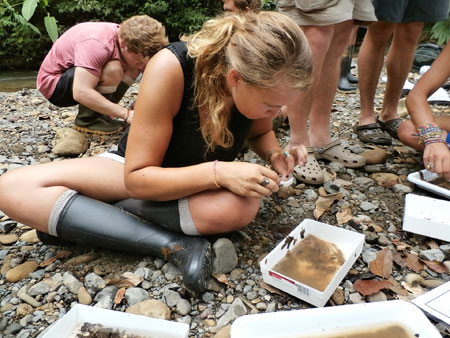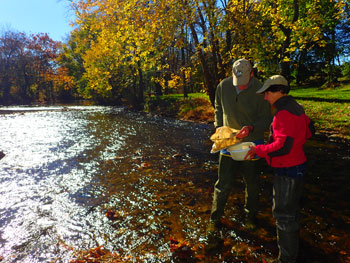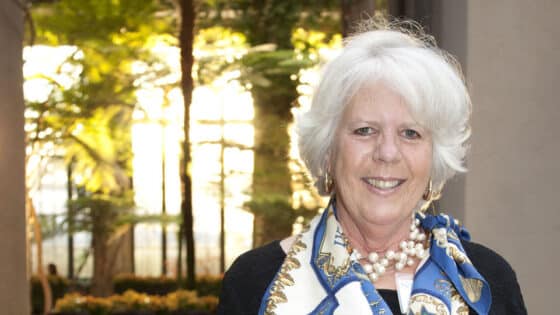PRESS RELEASE
FOR IMMEDIATE RELEASE: July 14, 2016
FOR MORE INFORMATION CONTACT:
Diane Huskinson
Stroud Center Receives $2.5 Million Grant to Boost Citizen-Science Water-Quality Monitoring in Delaware River Basin

Stroud Water Research Center helps citizen scientists worldwide to monitor the health of their streams and rivers. In October 2014, Assistant Director of Education Tara Muenz traveled to Costa Rica’s Osa Peninsula to train citizen scientists in watershed monitoring. These volunteers often become leaders in their communities, helping to organize events promoting clean water and watershed stewardship. Photo: Tara Muenz
AVONDALE, Pa. — Citizen-science volunteers will soon monitor the state of threatened water sources for millions of people. Stroud Water Research Center will help guide the effort under a $2.5 million grant from the William Penn Foundation. The goal is to enhance citizen-science volunteer monitoring of water quality in eight regional subwatersheds in the Delaware River basin.
The grant is part of the Delaware River Watershed Initiative, which was initially funded with $35 million in 2014 and then supplemented with additional funding in 2015-2016. More than 50 leading nonprofits are working together through DRWI to reduce threats to water quality for the 15 million people — more than 5 percent of the U.S. population — who get their drinking water from the Delaware River basin.
The eight carefully selected subwatersheds, or clusters, make up 25 percent of the Delaware River basin and are of critical ecological value. A science-informed evaluation under DRWI showed that while these clusters face significant threats to water quality, the opportunity for successful intervention is significant at these locations.

Citizen scientists with the New Jersey Department of Environmental Protection’s Watershed Ambassador Program learned how to collect and identify insects from a tributary to the Delaware River in northwestern New Jersey last October as part of Stroud Water Research Center’s Stream School. The education program is one of several the Stroud Center offers to help people monitor and protect their rivers and streams. Photo: Tara Muenz
Each cluster is comprised of three to 11 organizations jointly implementing restoration or preservation plans. With this new William Penn grant, the Stroud Center will work with these organizations and their partners to grow their network of citizen-science volunteers and enhance the quality and quantity of the data they collect. The Stroud Center will offer similar support to Penn State’s Master Watershed Steward Program, which trains volunteers in watershed management so they can educate communities about watershed stewardship and will also evaluate if, and how, the Water Stewards Program can assist in advancing the monitoring capacity of DRWI clusters.
Erin Frederick, the Master Watershed Steward coordinator at Penn State, said, “I’m looking forward to working with the Stroud Center to provide advanced training and volunteer opportunities to our Stewards so they can play a key role in citizen-science water-quality monitoring.”
The Stroud Center will work with the Academy of Natural Sciences of Drexel University to ensure that the water-quality monitoring collected by volunteers will help scientists better understand how well watershed restoration and conservation efforts in the Delaware River basin are working to protect clean fresh water.
Over the next two years, the Stroud Center will develop and provide professional-level science training to citizen-science volunteers, covering basic watershed ecology and more advanced topics on how to monitor and restore streams and rivers.
Matthew Ehrhart, director of watershed restoration, said, “The trainings will help citizen scientists better understand what questions they should be asking and why. Plus they’ll learn how to analyze and interpret the monitoring data they collect so they can use it to guide future restoration and conservation work.”

Stroud Water Research Center’s new custom Arduino-based data-logger board, the EnviroDIY Mayfly, is one of several inexpensive and easy-to-use tools that citizen scientists can learn to use to monitor water quality as part of the Delaware River Watershed Initiative. Photo: S. Hicks
The citizen-science volunteers will also learn to use new cutting-edge technologies to monitor and evaluate water quality. For example, they’ll learn how to build and deploy do-it-yourself wireless environmental monitoring stations the Stroud Center recently developed. These inexpensive, customizable, and easy-to-use sensors are featured on EnviroDIY.org, an online community of enthusiasts who enjoy sharing ideas for environmental science and monitoring. With these devices, the citizen scientists will be able to measure water temperature, stream water level, electrical conductivity, water clarity, and more.
Data the citizen scientists collect will stream automatically to a web portal to be developed over the next two years by computer scientists and programmers under the direction of Jeffery Horsburgh, Ph.D., in the Civil and Environmental Engineering Department at Utah State University. All of the data will be available via a website designed to provide citizen scientists with simple access to visualize, analyze, and download the data they collect.
Tried-and-true monitoring methods such as the Leaf Pack Experiment Stream Ecology Kit, will also be featured in the trainings. This simple tool can be used to collect, identify, and analyze the bugs living in streams to evaluate water quality.
William Penn Foundation’s Director of Watershed Protection, Andrew Johnson, said, “We are thrilled that Stroud Water Research Center will use this grant to help DRWI clusters expand citizen science to help streamline their efforts to monitor water quality. The goal of DRWI citizen science is to, not only engage the public with conservation, but train and deploy volunteers to generate meaningful, professional-quality water data that can be shared more broadly across the watershed.”
The grant builds on the Stroud Center’s ongoing efforts to work with farmers and landowners in the Delaware River basin to protect, restore, and monitor the long-term health of streams. To learn more, go to www.stroudcenter.org.
About The William Penn Foundation
The William Penn Foundation, founded in 1945 by Otto and Phoebe Haas, is dedicated to improving the quality of life in the Greater Philadelphia region through efforts that increase educational opportunities for children from low-income families, foster creativity that enhances civic life, and ensure a sustainable environment.
WPF’s environmental work funds efforts that help accelerate conservation of the Delaware River watershed. In an unprecedented collaboration to protect and restore water quality, more than 50 leading nonprofits have joined together in eight targeted areas where, informed by science, they are aligning priorities for restoration and land protection. Known as the Delaware River Watershed Initiative, it aims to amplify conservation impact which can be corroborated by periodic water quality assessments. Go to DRWI.net for more details.



